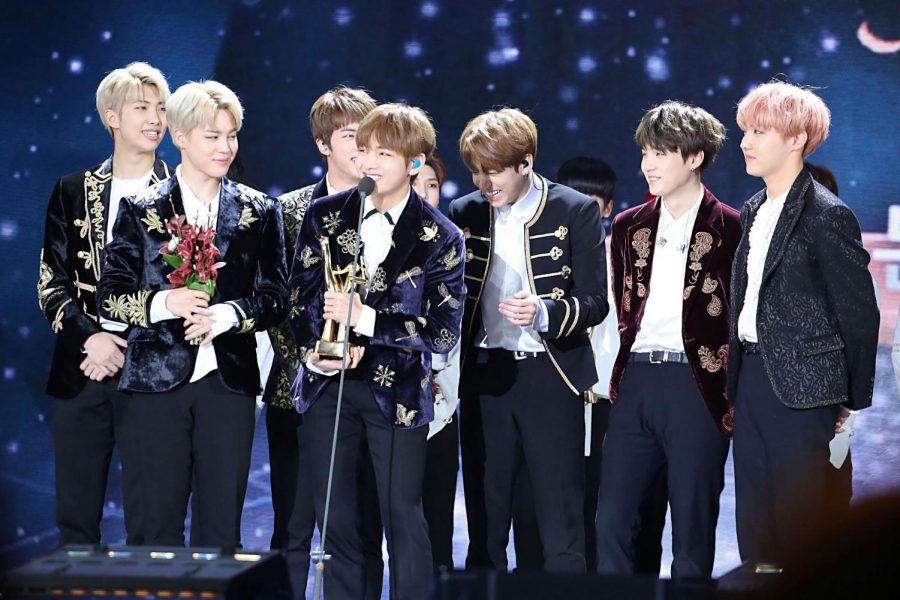K-pop group BTS brings music craze to CHS
PHOTO COURTESY OF CREATIVE COMMONS.
Korean-Pop group BTS poses for a picture in their studio.
January 9, 2018
In 2012, South Korean rapper PSY released “Gangnam Style,” a song that encaptured America and had everyone dancing for months after. However, the Gangnam Style craze doesn’t even begin to encompass the K-pop craze that was to follow.
To fully grasp K-pop mania, one has to first understand what it is. K-pop is exactly what it sounds like — Pop music originated from South Korea. However, many aspects, including the prolificness of the artists, the training of the groups and the dedication of the fanbases separate it from the typical American pop artists.
“Kpop is similar (to pop) in the sense that it is just another genre, but what separates it from western music is that it’s so much more dynamic,” junior and K-Pop fan Tanya Kambou said.
Last Nov., BTS (Beyond the Scene), an internationally renowned South Korean boy band, stole the show at the 2017 American Music Awards. Their performance of their smash hit, “DNA,” sparked a social media frenzy. Following their performance, BTS became the number one trending topic on social media. Everything, from their intricate choreography to their impressive rapping to the unique dedication of the crying fans in the audience, ignited a newfound interest in America.
Since their performance, “DNA” has peaked at #67 on the Billboard charts, and BTS has made appearances on “The Tonight Show” with Jimmy Fallon and “The Late Late Late Show” with James Corden. BTS has also been named the most searched topic on Twitter worldwide in 2017. Their unprecedented success in America has opened new doors for other K-pop bands who would like to follow in their footsteps.
“I’m glad that K-pop artists are being given chances to come to America and I think that it’s amazing how they have grown to become the centers of global attention,” junior Sebin Jeon said. “Although I believe that Western validation should not define the success of Korean groups, I’m proud that K-pop artists are reaching larger audiences and representing Korean music and culture in America.”
According to the New York Times podcast “Popcast”, K-pop stars become “trainees” once they audition for an entertainment company, in which they spend two to five years perfecting their craft. Referred to by Spin Magazine as “Korea’s Pop factory,” the level of manufacturing in K-pop may seem monumental, but it is not considerably more than the manufacturing of U.S artists; K-pop labels are just more transparent about it.
“Artists have to go start out as trainees and they go through a rigorous training to be able to debut,” Kambou said. “They have to have a certain skillset in order to even make it and some artists don’t even get to debut.”
Another aspect of K-pop that separates it from Western culture is the sheer dedication of their fanbase. Many superstars have seen the absolute mania surrounding their fans, whether it be Beatlemania or Bieber Fever, but the level of pandemonium surrounding K-pop artists is unmatched. Few fan bases in history can compare to the level of dedication that the “BTS army” and other supporters have towards their artists. Cutaway shots of women in the audience sobbing during BTS’ AMA performance is only a small indication of the magnitude of their support.
“K-pop fans often feel more connected to their favorite groups or solo artists,” Jeon said. “The Korean music industry puts a lot of emphasis on interacting with fans, [and]…fans feel closer to their artists as they get to know their personalities and talent.”
Although BTS may be the most mainstream K-pop band at the moment, there is a world of K-pop girl groups, guy groups and solo artists to discover.
Some people, such as Kambou, are a fan of the more well known bands: BTS, Shinee, Seventeen, Wondergirls, EXO and Loona. OHowever, others such as junior Alexis Oppong, enjoy the lesser-known musicians, such as SF9, Jay Park, Uptension and Gray. Jeon enjoys underrated artists as well; iKON!, Blackpink, Zion. T, Crush and Dean, to name a few.
“I’ve been listening to Korean music and keeping up with K-pop since I was in elementary school,” Jeon said. “I really like how I can find a wide variety of artists in Korea who can take on different genres of music.”
The rise of K-pop in America has been long overdue, but now that it is finally happening, people are celebrating increased representation for East Asian musicians, considering the astounding lack of representation thus far.
“K-pop getting bigger in the U.S is such a great thing [since] there is not a lot, if any, Asian representation in the music industry, so I am glad the doors are slowly opening for them,” Kambou said. “K-pop becoming more popular in the U.S validates non-English languages and shows people that there are groups that can outsell [U.S] favorites in a heartbeat and they don’t need English to do it.”


